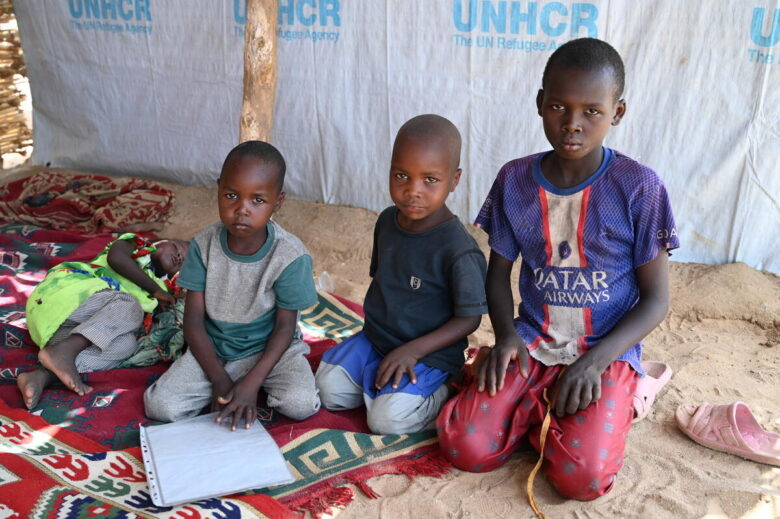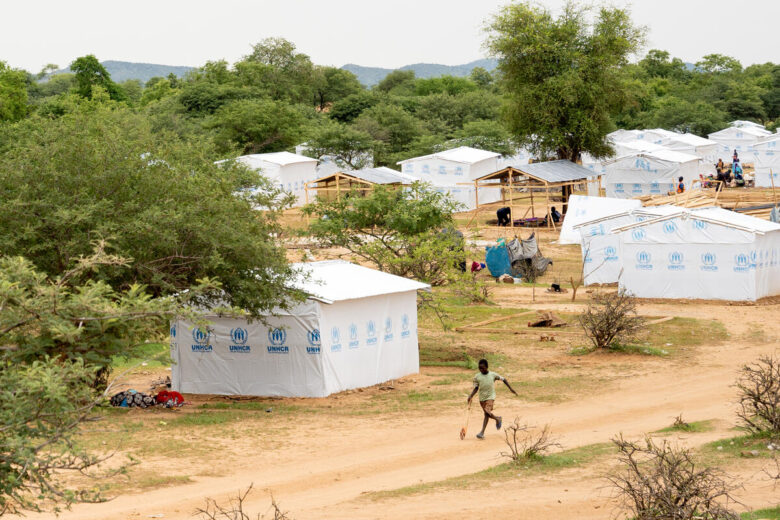
Abdoulaye Ibrahim Abakar, his wife Hawaye Ahmat Abdoulaye, and their foster children Maimouna and Saleh in their shelter at Arkoum refugee camp in eastern Chad. © UNHCR/Levon Sevunts
Dozens of refugee families in eastern Chad are caring for orphaned and unaccompanied children amid what the UN is calling the world’s largest child displacement crisis
By Levon Sevunts in Arkoum refugee camp, Chad
As he collapsed under a desert tree, crippled by the searing pain from a bullet wound in his calf, and with gunfire still echoing in his burning village in Darfur, western Sudan, Abdoulaye had two priorities. First, stop the bleeding; second, figure out how to get himself and his wife safely to the nearby border with Chad.
But when a group of neighbours stopped by the same tree to catch their breath, Abdoulaye’s priorities quickly changed. In the chaos of escaping from the militia that raided their village, the neighbours had found two small children whose mother had been killed in the attack and whose father had disappeared.
The neighbours left the children with Abdoulaye and his wife Hawaye and continued their own frantic flight for the relative safety of the Chadian border.
There was no question of leaving the terrified children behind, Abdoulaye recalled in his new shelter in Arkoum refugee camp, eastern Chad. He watched as the two young children – 5-year-old Saleh and his little sister Maimouna, 3 – played beneath the canopy of their shared home.
“I decided that if we die, we will die together, I’m not abandoning the children,” he said of the hot summer afternoon in 2023 when he fled his home and found the children.
Soon after the conflict in Sudan ignited in April 2023, Abdoulaye and Hawaye had sent their own three children to Chad for safety, where they were living with family members. As he limped into the camp with his wife and the two rescued children, Abdoulaye discovered that news had spread that he had died in the attack on their village.
Welcomed to the family
“Everyone thought that I was dead,” he said. “They were so happy to see me alive.”
Abdoulaye and Hawaye were reunited with their children who welcomed their two new siblings with open arms.
“If we die, we will die together.”
Abdoulaye, Sudanese refugee

Sudanese refugee Maimouna, 3, naps while her brother Saleh, 5, and their foster siblings Salim and Zakaria kneel beside her. © UNHCR/Levon Sevunts
Since then, the search for Saleh and Maimouna’s father has continued without success. Abdoulaye fears he may have been killed in the fighting.
He and Hawaye are now part of a fledgling foster family programme run by the Jesuit Refugee Service with support from UNHCR, the UN Refugee Agency. There are eight other refugee foster families in the sprawling Arkoum camp, and a total of 55 in the five refugee settlements in the wider Hadjer Hadid area of eastern Chad, according to Nathalie Etienne, a Community-Based Protection Officer at UNHCR.
“These families have endured unimaginable violence and hardship as they fled their native Darfur region of Sudan,” she said. “And yet they have opened their homes and their hearts to care for children who have lost their parents.”

A boy plays on a road in Arkoum refugee camp, eastern Chad, in August 2023. © UNHCR/Ariadne Kypriadi
The refugee foster family programme provides training and assistance for participating families. To ensure the safety and well-being of orphaned and unaccompanied children who arrive in Chad, UNHCR and partners conduct thorough evaluations before placement and continuous follow-up assessments with foster families.
The world’s largest child displacement crisis
The conflict between the Sudanese Armed Forces and the paramilitary Rapid Support Forces has forced over 11.5 million people to flee since April last year, including an estimated 5 million children, making Sudan the world’s largest child displacement crisis according to the UN agency for children, UNICEF.
Almost half of the 3 million people who have fled from Sudan to neighbouring countries are children, while in Chad itself, over 60 per cent of the 710,000 refugees who have escaped the war are under 18.
At a news briefing in Geneva on Friday, UNHCR’s Director for External Relations Dominique Hyde said some 60,000 Sudanese refugees had crossed into Chad in October alone – levels not seen since the beginning of the crisis – including increasing numbers of malnourished children.
The ongoing war has triggered a deadly mix of displacement, disease and hunger. The UN estimates nearly 4 million children under five will face acute malnutrition this year, with 730,000 at risk of severe acute malnutrition.
The conflict has also unleashed one of the world’s worst education crises, with more than 90 per cent of the country’s 19 million school-age children having no access to formal education.
“Civilians are paying the highest price in this violent conflict,” said Hyde, who visited the country last week. “A staggering 71 per cent of refugees arriving in Chad report surviving human rights violations in Sudan while fleeing. The levels of trauma are devastating, with families in shock after fleeing the horrors, still living in fear despite being in relative safety.”
Abdoulaye said he hopes that in Chad all the children he cares for will receive an education and opportunities that he never had in Darfur. “I didn’t have the chance to study. My family had a lot of animals, so I grew up raising cattle,” he said. “I want all of my children to go to school and build a better life for themselves.”
But that is a dream for the future. Today he is more concerned about where their next meal will come from, especially now that Saleh and Maimouna are part of the expanded family.
“The children will live with us as long as I’m alive; what we eat they will eat,” Abdoulaye said. “I nearly died but Allah saved my life, I beg him to save these children too and help them succeed.”
Originally published by UNHCR on 8 November 2024.


